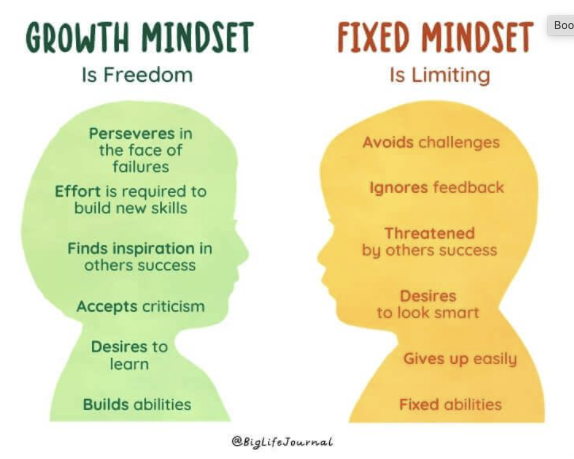Growth vs. Fixed Mindset
Dr. Carol Dweck coined the phrase “growth mindset” to refer to the underlying beliefs individuals have about themselves and their learning. Individuals who believe their talents can be developed are described as having a “growth mindset.” This means that they are able to learn (i.e., “grow”) through practice, effort, and perseverance. They tend to put a lot of energy into learning and view progress as success. They are not afraid of failure.
On the other hand, individuals who believe their talents are innate are described as having a “fixed mindset.” This means that they believe their talents are predetermined and unchanging. These individuals tend to focus on doing what they know and are comfortable with, particularly in order to avoid failure.
The below image outlines phrases that an individual with a growth vs. fixed mindset might say:
The following image describes the traits that an individual with a growth vs. fixed mindset might have:
At BIO Girls, we believe in the importance of having a growth mindset. We teach girls that failure is a gift, one that doesn’t define you. Failure encourages growth and teaches coping skills, emotional resilience, creative thinking, and the ability to collaborate. In some of our sessions, girls will fail, learn, and persevere while building a catapult, catching tootsie rolls in plastic cups, or making origami. BIO Girls encourages an “I can” attitude and emphasizes the importance of trying new things and being challenged. As a result, by the end of the program, a notable change that parents see in their daughters is a gain in CONFIDENCE.
Parents can encourage the development of a growth mindset by openly sharing their own failures with their daughters, discussing prominent failures throughout history, learning about how the brain grows and develops, and providing a safe space at home for their daughters to practice failing. Parents can create a safe space for practicing failing by:
Providing opportunities for their daughters to take risks and embrace challenges, even in activities such as sports, writing, building, or playing games.
Giving their daughters some independence to try things on their own, and praising the process of learning rather than the result.
Encouraging a “try, try again” attitude while working hard through difficult situations.
Did you know that famous people have failed, yet we remember them as huge successes? They all had growth mindsets! Take a few minutes and look up the failures of: Abraham Lincoln, Thomas Edison, Walt Disney, and J.K. Rowling.
Dr. Beth Salafia, Ph.D
Director of Programming and Research
BIO Girls
Do you have a desired topic for BIO Girls to cover? Perhaps an issue your daughter is facing?
Drop it down below!



